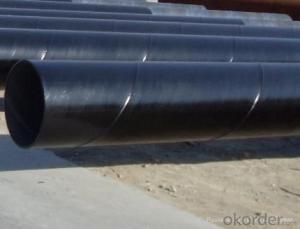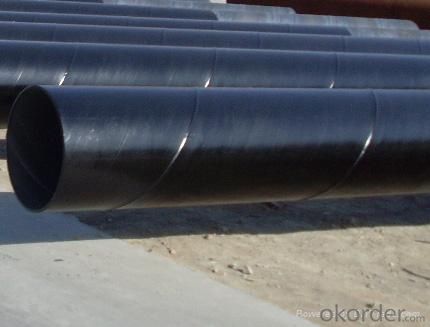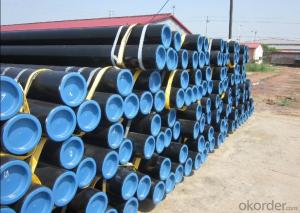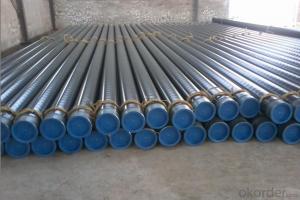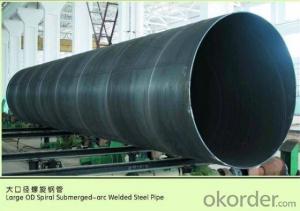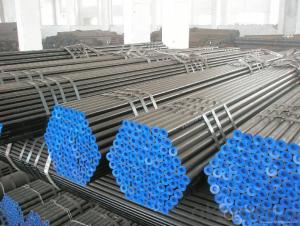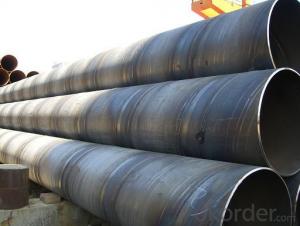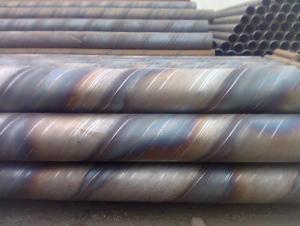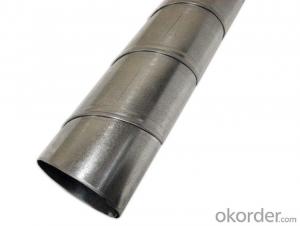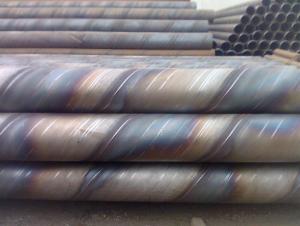SPIRAL WELDED STEEL PIPE 16/18/20/22/24/26/28'' CARBON
- Loading Port:
- Tianjin
- Payment Terms:
- TT OR LC
- Min Order Qty:
- 5 m.t
- Supply Capability:
- 3000 m.t/month
OKorder Service Pledge
OKorder Financial Service
You Might Also Like
Packaging & Delivery
Packaging Detail: | standard export packing or as customer's requirement |
Delivery Detail: | within 10 - 30 days |
Specifications
Spiral Welded Steel Pipes and Tubes
1.Material:Q195-Q235
2.Length:1-12m
3.WT:1.0-14mm
4.O.D.:20-273mm
Spiral Welded Steel Pipes and Tubes
Product Description:
1.Material : Q235,Q345,L245,L290,L360,L415,L450,L485,GrB,X42,46,X52,X56,X60,X65,X70,X80,X100
2,Standard: SY/T5037-2000,GB/T9711-2011,API Spec 5L PSL1/PSL2,ASTM A252\A53,ISO3183,DIN17172,EN10217,JIS G3457,AWWA C200,ASTM A139,ASTM A671,ASTM A672
3.Wall thickness: 3.0mm-30mm
4.Outer diameter: φ168mm-3020mm
5,Length: 5m-12m or as your requirement
6,Corrosion protection standard: DIN30670,DIN30671, AWWAC210, AWWA C203, SY/T0413-2002,SY/T0414-2002
7,Application: Oil, gas, natural gas, water pipe, thermal electricity pipe, steel structure engineering, etc
Q195-q345 Material Steel Pipe's Materials
Elements | Chemical Compsition% | Mechanical Property | ||||||
C% | Mn% | S% | P% | Si% | Yield Point (Mpa) | Tensile Strength(Mpa) | Elongation | |
Q195 | 0.06-0.12 | 0.25-0.50 | <0.050< span=""> | <0.045< span=""> | <0.030< span=""> | >195 | 315-430 | 32-33 |
Q215 | 0.09-0.15 | 0.25-0.55 | <0.05< span=""> | <0.045< span=""> | <0.030< span=""> | >215 | 335-450 | 26-31 |
Q235 | 0.12-0.20 | 0.30-0.70 | <0.045< span=""> | <0.045< span=""> | <0.030< span=""> | >235 | 375-500 | 24-26 |
Q345 | <0.20< span=""> | 1.0-1.6 | <0.040< span=""> | <0.040< span=""> | <0.55< span=""> | >345 | 470-630 | 21-22 |
Packaging & Delivery
Packaging Detail: | Normal exporting packing,in container or bulk vessel or as per clients' request |
Delivery Detail: | 2 months after confimed contract |
Specifications
Large Diameter API 5L X70 PSL2 LSAW Steel Pipe
Grade: X42, X46, X50, X52, X60, B, C
OD: 1.5"-28"
WT: SCH10-SCH160
Brand:TPCO
Large Diameter API 5L X70 PSL2 LSAW Steel Pipe
Specifications:
u Standard: API 5L
u Grade: B, C, X42, X46, X50, X52, X56, X60, X65, X70, X80
u OD: 1.5"-28"
u WT: SCH10-SCH160
u Length: 5-12m
u Ends Finish: plain end, bevel end, grooved end
u Surface Treatment: bare, black varnished, oiled finish, red color, anti-corrosion, 3PE, FBE or epoxy coating
u Technique: hot rolled or cold drawn
u Application: api 5l steel pipe for conveying oil, water, gas
u Invoicing: based on theoretical weight or actual weight
u Payment Terms: L/C at sight, T/T or Western Union
u Trade Terms: FOB, CFR, CIF
u Certification: ABS manufacturing assessment, ABS design assessment, API 5CT, API 5L, DNV manufacturer certificate, ISO9001 quality management system certificate, ISO14001 environment management system certificate, GB/T28001 occupational health and safety management system certificate, A1 class manufacturing license of special equipment certificate, CCS, GL, LR, SGS, TüV, PDE
- Q: What time what time for gas pipeline steel pipe PE pipe
- PE pipe must be installed underground, the steel tube can be exposed, when not all PE pipe for pipe laying, overhead installation. But the steel tube is easy to rust, so it can be used where the basic use of PE pipe buried PE pipe.There are galvanized steel pipe and seamless steel pipe, galvanized pipe can only be used for low-pressure homes
- Q: When can I use the PVC pipe and when to use the galvanized pipe?
- PVC pipeline use temperature is -5 to 90 degrees or so, according to the current market price of around 6000 yuan per ton, the price is cheap. Its corrosion resistance is good, can resist most of the acid and alkali, and unlike the steel pipe that is easy to rust, so in the construction of the upper and lower water pipes and other fields have gradually replaced the trend of steel pipe.
- Q: How are steel pipes used in the automotive industry?
- Steel pipes are commonly used in the automotive industry for various applications such as exhaust systems, fuel lines, and structural components. They provide strength, durability, and resistance to corrosion, making them ideal for withstanding high temperatures and harsh conditions. Steel pipes are essential in ensuring efficient exhaust gas flow, delivering fuel to the engine, and providing structural support to enhance vehicle safety and performance.
- Q: What are the different end finishes for steel pipes?
- There are several different end finishes for steel pipes, depending on their intended use and the specific requirements of the application. Some of the most common end finishes for steel pipes include: 1. Plain End: This is the simplest and most common type of end finish, where the pipe is cut square at both ends without any additional treatment or threading. Plain end pipes are typically used for low-pressure applications or when the pipe will be connected using welding methods. 2. Beveled End: A beveled end finish involves cutting the pipe at an angle, usually 30 or 37.5 degrees, to facilitate easier welding and create a stronger joint. Beveled end pipes are commonly used for butt-welding applications, where two pipes are joined together by aligning the beveled ends and welding them. 3. Threaded End: In this end finish, the pipe is threaded at both ends to allow for easy connection with threaded fittings or couplings. Threaded end pipes are commonly used in plumbing and gas distribution systems, as well as for applications that require frequent disassembly and reassembly. 4. Coupled End: Coupled end finishes involve the installation of couplings or connectors at each end of the pipe. This allows for quick and easy connection of pipes without the need for additional threading or welding. Coupled end pipes are often used in oil and gas pipelines or in applications where rapid installation is required. 5. Grooved End: A grooved end finish involves cutting grooves into the pipe's ends and using mechanical couplings or fittings to join the pipes together. This type of end finish is commonly used in fire protection systems, as well as for large-diameter pipes that require quick and efficient assembly. 6. Flanged End: Flanged end finishes involve attaching flanges to the pipe ends, which can be bolted together to create a secure and leak-proof connection. Flanged end pipes are commonly used in applications that require easy disassembly and reassembly, such as in chemical plants or refineries. It is important to note that the choice of end finish for a steel pipe depends on factors such as the application, the required joint strength, the type of connection method, and the compatibility with other system components. Consulting with a professional or referring to industry standards is recommended to ensure the correct end finish is selected for a specific application.
- Q: How are steel pipes used in the transportation industry?
- Steel pipes are commonly used in the transportation industry for various purposes such as the construction of pipelines, including oil and gas pipelines, water pipelines, and sewage pipelines. They are also used in the manufacturing of automotive parts, such as exhaust systems, and in the construction of infrastructure such as bridges and tunnels. Additionally, steel pipes are used in the transportation of goods through shipping containers and railway tracks.
- Q: What is an electric welded pipe (EFW)? Seek help!
- According to the operation requirements of the electric welding machine, connect the lead wire and set up the proper welding parameter of the electric welding machine, which can be operated by manual or automatic two input methods.After checking, start the electric welding machine and enter the welding process. When the welding time is reached, the machine will automatically enter the cooling state.When the pipe completely removed after cooling, electric fusion welding machine.Cutting the pipe with the cutting tool of plastic pipe or fine toothed saw with cutting guide device, and making its end face perpendicular to the axis of pipe. Remove the edges of the edges with a knife, scrape the weld area in the pipe or spigot end and clean the weld area.Should use the special fixture as far as possible to secure the components to be connected, and the roundness of the pipe shall not exceed 1.5% of the outer diameter of the pipe, or it should be corrected on the corresponding fixture.
- Q: What are the different types of steel pipe connections for steam pipelines?
- There are several types of steel pipe connections commonly used for steam pipelines. These include threaded connections, flanged connections, welded connections, and grooved connections. Each type has its own advantages and is chosen based on factors such as the pipe size, pressure, and temperature requirements, as well as the ease of installation and maintenance.
- Q: How are steel pipes protected against ultraviolet (UV) radiation?
- Steel pipes are typically protected against ultraviolet (UV) radiation through the application of specialized coatings or paints that act as a barrier, preventing direct exposure of the steel to UV rays. These coatings are designed to withstand UV degradation, prevent corrosion, and extend the lifespan of the pipes.
- Q: What are the potential health hazards associated with steel pipe installation?
- Some potential health hazards associated with steel pipe installation include exposure to hazardous chemicals used in the coating or treatment of the pipes, inhalation of dust or fumes generated during cutting or welding, and physical injuries due to accidents or mishandling of heavy equipment. Additionally, improper handling or disposal of waste materials and contaminated water can pose environmental health risks. It is important to follow proper safety protocols, use personal protective equipment, and ensure proper ventilation and waste management to mitigate these hazards.
- Q: What are the environmental impacts of using steel pipes?
- The environmental impacts of using steel pipes include the extraction and processing of raw materials, such as iron ore and coal, which contribute to deforestation, habitat destruction, and greenhouse gas emissions. The manufacturing process also generates significant amounts of waste, including slag and emissions from steel production. The transportation and installation of steel pipes contribute to carbon emissions, while their corrosion and maintenance may result in the release of toxic substances into the environment. Proper waste management and implementing sustainable practices can help mitigate some of these impacts.
Send your message to us
SPIRAL WELDED STEEL PIPE 16/18/20/22/24/26/28'' CARBON
- Loading Port:
- Tianjin
- Payment Terms:
- TT OR LC
- Min Order Qty:
- 5 m.t
- Supply Capability:
- 3000 m.t/month
OKorder Service Pledge
OKorder Financial Service
Similar products
Hot products
Hot Searches
Related keywords
